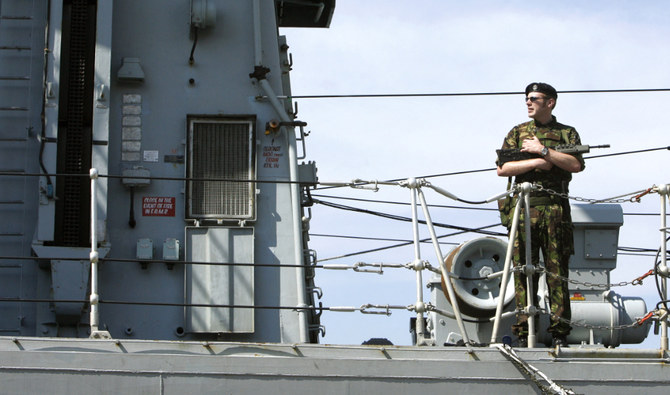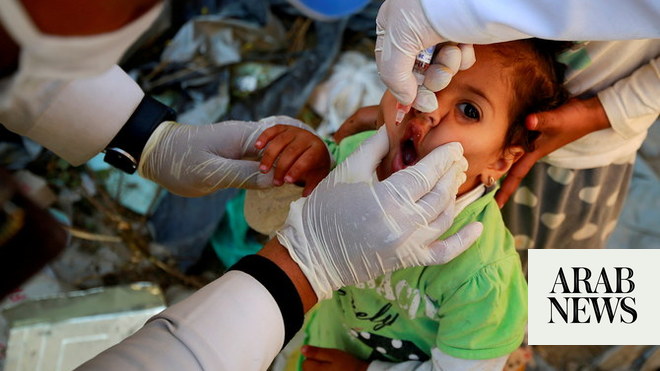
Aron vows strong international reaction if militias put peace process at risk
Many people believe that there’s a ‘Saudi blockade’ attempting to starve the northwest of the country in order to defeat the Houthis
DUBAI: The Houthi militia’s occupation of parts of Yemen has increased people’s suffering, which has been falsely blamed on a “Saudi blockade,” said the British ambassador to Yemen.
“It’s no coincidence that the number of people in need of aid, now at a staggering 24 million, has increased enormously since the Houthis took over parts of the country,” Michael Aron told Arab News in an exclusive interview.
The British diplomat, who was appointed ambassador to Yemen in February 2018, said the UK supports the internationally recognized government of President Abed Rabbo Mansour Hadi, who “was forced to flee Sanaa following a rebel insurgency that took the capital by force (in September 2014) and overthrew the legitimate government. This is a fact.”
The Iranian-backed Houthis took over the presidential palace, where Hadi and his ministers remained under house arrest.
He managed to return to his hometown of Aden. In response, Houthi forces advanced toward Aden, causing Hadi to flee to Saudi Arabia, which led an air campaign to defeat the Houthis.
Almost four years of fighting and five attempts at peace talks later, there is no end to the war in sight.
“There can be no military solution to this war. The longer the conflict continues, the more the people of Yemen will suffer as the humanitarian crisis worsens,” Aron said.
According to the independent Armed Conflict Location and Event Data Project (ACLED), 60,000 people have been killed since 2016.
British charity Save the Children estimates that 85,000 children under the age of 5 have starved to death since 2015.
Meanwhile, a devaluation of Yemen’s currency and food shortages have led to famine in parts of the country.
“The worsening economy has devastated people’s purchasing power. In many cases, there’s food and fuel, but people can’t afford to buy it,” Aron said.
“Many people believe that there’s a ‘Saudi blockade’ attempting to starve the northwest of the country in order to defeat the Houthis. This is simply not true … The reality is that there’s no blockade.”
The UK and the UN monitor food and fuel going into Hodeidah and other Yemeni ports, in an agreed process for the inspection of ships, the ambassador said.
The UN had been prevented from entering the Red Sea Mills, which has enough grain to feed 3.7 million people for a month, in Hodeidah since September 2018. Officials finally gained access on Tuesday.
A humanitarian corridor was meant to be opened in Hodeidah last month as part of the deal that was signed in December in Stockholm by the Houthis and the Yemeni government, but the UN said the militia has failed to honor the agreement.
However, Aron said the talks were a success. “Many believed they wouldn’t happen or we’d be in the same situation we were in Geneva, when the Houthis didn’t arrive,” he added, referring to when the Iranian-backed militia refused to attend peace talks in Switzerland in September 2018.
Although slow, progress has been made, and there has been a significant reduction in military activity, specifically in Hodeidah, as well as regular meetings between the warring sides, which was not the case previously, Aron said.
Last month, delegations from both sides met in Jordan to discuss prisoner swaps. As a result, Saudi Arabia released seven prisoners the day after a Saudi prisoner was freed by the Houthis.
Last week, the warring parties agreed to start withdrawing forces from the main port of Hodeidah.
This came after Maj. Gen. Patrick Cammaert, who had been heading the UN operation monitoring a cease-fire in Hodeidah, was replaced by Lt. Gen. Michael Lollesgaard due to a disagreement with the Houthis.
Aron said the international community will react strongly if the Houthis put the peace process at risk.
The next round of talks will take place when “sufficient progress has been made” on the Stockholm agreement, he added.
“I hope and believe we’re much closer to the end than the beginning of this war,” he said, although adding that there is still a long way to go.










